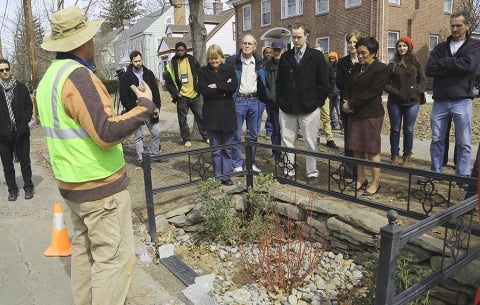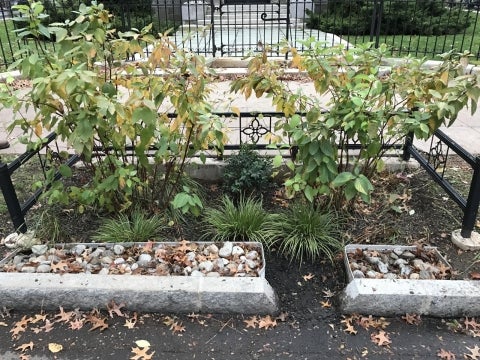Note: Yale School of the Environment (YSE) was formerly known as the Yale School of Forestry & Environmental Studies (F&ES). News articles and events posted prior to July 1, 2020 refer to the School's name at that time.
 Chris Ozyck, associate director of the URI, explains the green infrastructure project to community leaders and New Haven residents on West Park Avenue in 2015. Mayor Toni Harp is third from the right.
Chris Ozyck, associate director of the URI, explains the green infrastructure project to community leaders and New Haven residents on West Park Avenue in 2015. Mayor Toni Harp is third from the right.
A community partnership including the Yale-based Urban Resources Initiative (URI) that has helped the city of New Haven tackle the challenge of stormwater runoff has received a prestigious award from Harvard’s John F. Kennedy School of Government.
The 2018 Roy Family Award for Environmental Partnership was awarded to the Advancing Green Infrastructure Program, a public-private partnership, which has built hundreds of “bioswales” across the city to reduce the pollution and flooding impacts of stormwater runoff.
The 2018 Roy Family Award for Environmental Partnership was awarded to the Advancing Green Infrastructure Program, a public-private partnership, which has built hundreds of “bioswales” across the city to reduce the pollution and flooding impacts of stormwater runoff.
 The Yale-based Urban Resources Initiative is part of a city-wide initiative that has built hundreds of bioswales, which are landscaped areas near roadways that capture and infiltrate stormwater before it can reach the sewer system.
The Yale-based Urban Resources Initiative is part of a city-wide initiative that has built hundreds of bioswales, which are landscaped areas near roadways that capture and infiltrate stormwater before it can reach the sewer system.
The project was recognized for achieving an “inclusive, replicable approach to dealing with the negative impacts of more frequent and intense rainfall events due to climate change.”
The Urban Resources Initiative, a non-profit housed at the Yale School of Forestry & Environmental Studies, has been actively engaged in community forestry activities throughout New Haven since 1991.
Other partners in the initiative include EMERGE Connecticut, Inc., the New Haven Department of Engineering, the Greater New Haven Water Pollution Control Authority, and Common Ground High School.
Every year, about 257 million gallons of combined sewage containing sediment, excess nutrients, heavy metals, and human waste flow onto New Haven’s surface waterways when heavy rains overwhelm the city’s sewer system. In addition to causing flooding, this overflow sends wastewater pollutants into public water supplies and natural ecosystems.
In 2014, with the help of a National Fish and Wildlife Foundation grant, URI helped develop a pilot project to build and monitor 15 bioswales, which are landscaped areas near roadways that capture and infiltrate stormwater before it can reach the sewer system.
Bioswales are becoming an increasingly popular method to reduce and treat contaminated stormwater runoff in an economic way, said Gaboury Benoit, the Grinstein Class of 1954 Professor of Environmental Chemistry at F&ES and co-director of the Hixon Center for Urban Ecology. “The Advancing Green Infrastructure Program was an opportunity for our students — future leaders in the environmental management arena — to learn about these systems and to contribute to our knowledge of how well they function,” he said.
After demonstrating the effectiveness of the green infrastructure systems, URI and the partner organizations were able to secure funding for another 275 bioswales across the city.
The Urban Resources Initiative, a non-profit housed at the Yale School of Forestry & Environmental Studies, has been actively engaged in community forestry activities throughout New Haven since 1991.
Other partners in the initiative include EMERGE Connecticut, Inc., the New Haven Department of Engineering, the Greater New Haven Water Pollution Control Authority, and Common Ground High School.
Every year, about 257 million gallons of combined sewage containing sediment, excess nutrients, heavy metals, and human waste flow onto New Haven’s surface waterways when heavy rains overwhelm the city’s sewer system. In addition to causing flooding, this overflow sends wastewater pollutants into public water supplies and natural ecosystems.
In 2014, with the help of a National Fish and Wildlife Foundation grant, URI helped develop a pilot project to build and monitor 15 bioswales, which are landscaped areas near roadways that capture and infiltrate stormwater before it can reach the sewer system.
Bioswales are becoming an increasingly popular method to reduce and treat contaminated stormwater runoff in an economic way, said Gaboury Benoit, the Grinstein Class of 1954 Professor of Environmental Chemistry at F&ES and co-director of the Hixon Center for Urban Ecology. “The Advancing Green Infrastructure Program was an opportunity for our students — future leaders in the environmental management arena — to learn about these systems and to contribute to our knowledge of how well they function,” he said.
After demonstrating the effectiveness of the green infrastructure systems, URI and the partner organizations were able to secure funding for another 275 bioswales across the city.
This partnership demonstrates the impact of a highly-local, adaptive, iterative approach in addressing a critical environmental and municipal capacity challenge — and one that can be replicated in cities and towns all over the world.
“The Roy Award selection committee was especially impressed with the program’s integration of social and environmental goals, a result of the deliberate cultivation of trust between the partners and the community,” said Henry Lee, director of the Environment and Natural Resources program at Harvard Kennedy School’s Belfer Center for Science and International Affairs, which coordinates the award. “We believe that this partnership demonstrates the impact of a highly-local, adaptive, iterative approach in addressing a critical environmental and municipal capacity challenge — and one that can be replicated in cities and towns all over the world.”
The New Haven project was selected from a number of projects tackling environmental problems across the world, including initiatives that are improving energy access in refugee camps and promoting voluntary emissions reductions to achieve watershed-level conservation goals.
“We are truly fortunate to be able to work with such extraordinary partners, which has allowed us to simultaneously address environmental and social challenges facing our city,” said Colleen Murphy-Dunning, director of the Urban Resources Initiative. “Our collaboration has made it possible to connect resources to seemingly fragmented problems. Working with our partners through an integrated approach has led to solutions that bring co-benefits that would otherwise have been unrealized.”
The New Haven project was selected from a number of projects tackling environmental problems across the world, including initiatives that are improving energy access in refugee camps and promoting voluntary emissions reductions to achieve watershed-level conservation goals.
“We are truly fortunate to be able to work with such extraordinary partners, which has allowed us to simultaneously address environmental and social challenges facing our city,” said Colleen Murphy-Dunning, director of the Urban Resources Initiative. “Our collaboration has made it possible to connect resources to seemingly fragmented problems. Working with our partners through an integrated approach has led to solutions that bring co-benefits that would otherwise have been unrealized.”
Published
July 25, 2018